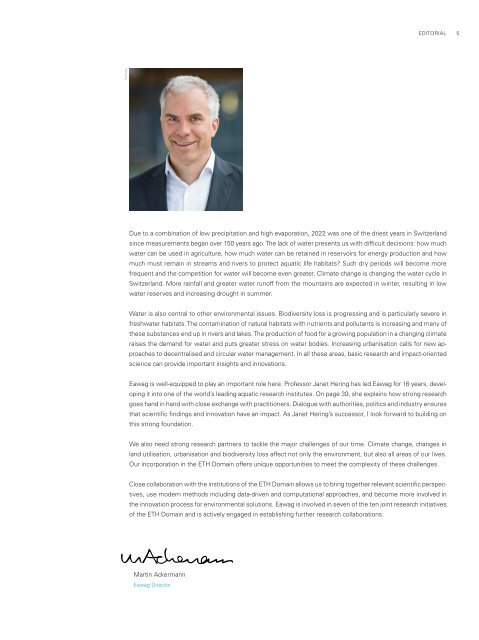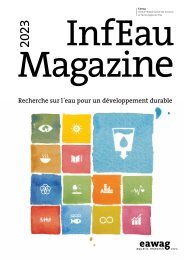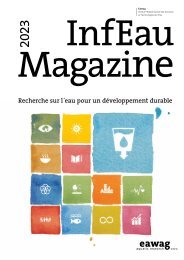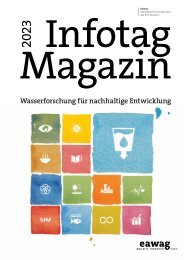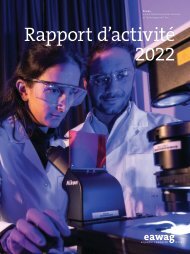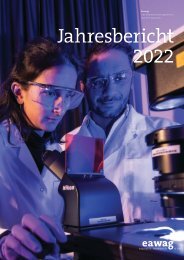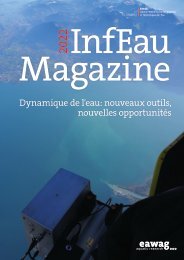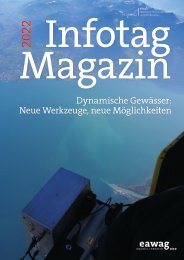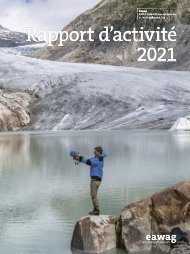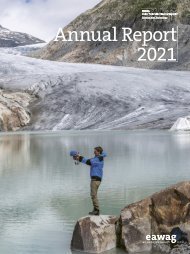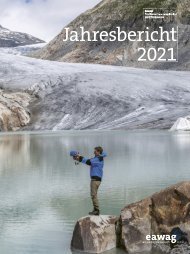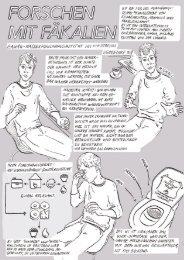Eawag Annual Report 2022
As the aquatic research institute of the ETH Domain, our research is in service of society. You can see this for yourself in our Annual Report. The annual compact review highlights the most relevant research results of the past year and shows how they were developed.
As the aquatic research institute of the ETH Domain, our research is in service of society. You can see this for yourself in our Annual Report. The annual compact review highlights the most relevant research results of the past year and shows how they were developed.
Create successful ePaper yourself
Turn your PDF publications into a flip-book with our unique Google optimized e-Paper software.
EDITORIAL<br />
5<br />
<strong>Eawag</strong><br />
Due to a combination of low precipitation and high evaporation, <strong>2022</strong> was one of the driest years in Switzerland<br />
since measurements began over 150 years ago. The lack of water presents us with difficult decisions: how much<br />
water can be used in agriculture, how much water can be retained in reservoirs for energy production and how<br />
much must remain in streams and rivers to protect aquatic life habitats? Such dry periods will become more<br />
frequent and the competition for water will become even greater. Climate change is changing the water cycle in<br />
Switzerland. More rainfall and greater water runoff from the mountains are expected in winter, resulting in low<br />
water reserves and increasing drought in summer.<br />
Water is also central to other environmental issues. Biodiversity loss is progressing and is particularly severe in<br />
freshwater habitats. The contamination of natural habitats with nutrients and pollutants is increasing and many of<br />
these substances end up in rivers and lakes. The production of food for a growing population in a changing climate<br />
raises the demand for water and puts greater stress on water bodies. Increasing urbanisation calls for new approaches<br />
to decentralised and circular water management. In all these areas, basic research and impact-oriented<br />
science can provide important insights and innovations.<br />
<strong>Eawag</strong> is well-equipped to play an important role here. Professor Janet Hering has led <strong>Eawag</strong> for 16 years, developing<br />
it into one of the world’s leading aquatic research institutes. On page 39, she explains how strong research<br />
goes hand in hand with close exchange with practitioners. Dialogue with authorities, politics and industry ensures<br />
that scientific findings and innovation have an impact. As Janet Hering’s successor, I look forward to building on<br />
this strong foundation.<br />
We also need strong research partners to tackle the major challenges of our time. Climate change, changes in<br />
land utilisation, urbanisation and biodiversity loss affect not only the environment, but also all areas of our lives.<br />
Our incorporation in the ETH Domain offers unique opportunities to meet the complexity of these challenges.<br />
Close collaboration with the institutions of the ETH Domain allows us to bring together relevant scientific perspectives,<br />
use modern methods including data-driven and computational approaches, and become more involved in<br />
the innovation process for environmental solutions. <strong>Eawag</strong> is involved in seven of the ten joint research initiatives<br />
of the ETH Domain and is actively engaged in establishing further research collaborations.<br />
Martin Ackermann<br />
<strong>Eawag</strong> Director


